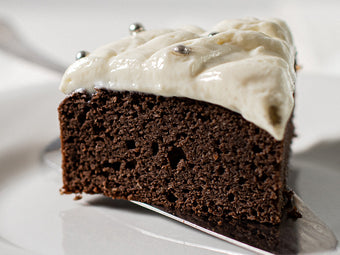6 tips to boost your gut health
Gut health appears to be the new buzzword in the wellness industry, with new brands of fermented foods like kombucha, sauerkraut and kefir popping up in the supermarkets. We wanted to know why our guts are so important and what we can do to boost our gut health, so we asked our nutritionist, Gemma, to explain.
The gut (often referred to as the digestive system) is a group of organs which spread from the mouth down to the rectum. They are home to approximately 100 trillion organisms including bacteria, viruses, fungi and protozoa. The bacteria is made up of both good and bad bacteria which appear to influence us in many ways. Evidence has shown that the good bacteria regulate digestion, extract nutrients from foods, remove toxins, train our immune systems and create hormones. When there is an imbalance between the good and bad bacteria, problems can occur. Scientists are only just beginning to understand the crucial link between gut health and the development of disease but there is evidence to suggest it can influence autoimmune conditions, obesity, mental health issues, allergies and skin health. Due to the complexity of our guts many scientists now refer to it as an organ and that it might be as influential as our genes.

Many diet, lifestyle and environmental factors can negatively affect your gut bacteria. For example, taking antibiotics is extremely important in treating infections however the antibiotics kill both the good and bad bacteria in your gut. Other factors include stress, smoking, drinking too much alcohol, an unhealthy diet such as too much sugar and not enough exercise. A diet of junk food has actually been shown to dramatically reduce gut microbes by 40% in just two days. Luckily there are lots of ways you can boost your gut health, so here are my 6 top tips.
Eat more fibre
Fibre is found in lots of plant-based foods including beans, pulses, grains, nuts, seeds, fruits and vegetables. Most people in the UK are only consuming around 18g of fibre per day when we are recommended to consume closer to 30g. There are two types of fibre, soluble and insoluble, which both help to regulate digestion. Soluble fibre absorbs water in the gut to form a gel-like substance which slows digestion, whereas insoluble fibre adds bulk to stools to help food move through the digestive system more quickly. Lo-Dough contains a special blend of both soluble and insoluble fibre, a double whammy for a healthy digestive system.
As well as supporting digestion, fibre helps to feed the good bacteria in your gut and therefore acts as a prebiotic. Soluble fibres, such as beta-glucan found in apples and oats, help to lower cholesterol levels. Fibre also has a low glycaemic index which means it helps to maintain healthy blood glucose levels. The best prebiotic foods are those that contain inulin including chicory root, artichokes, leeks, onions, garlic, celery and bananas.

Eat a varied diet
Most of us buy and cook the same foods every week. Findings from the American gut project (a large study looking at how diet and lifestyle affect the human microbiome) found that the number one factor determining how healthy our gut microbiome is was how many different plants we ate each week. They found that people who regularly ate 30 different types of plant foods each week had a more diverse microbiome than those eating less than 30 foods. This is because foods contain different nutrients that our microbes feed on and the more diverse our diet, the more diverse our gut microbes. Our obsession with processed foods, antibiotics and cleanliness has resulted in the diversity of our gut microbes being 30% lower than they were 50 years ago.
Each week we appear to only be eating around five different plants. To improve your gut diversity, try a new food each week and eat a variety of different plant foods including vegetables, fruits, nuts, seeds and grains.
Eat a more Mediterranean diet
The Mediterranean diet has been shown to help reduce your risk of developing conditions like high blood pressure, increased cholesterol and type 2 diabetes, which are all risk factors for heart disease. A typical Mediterranean diet includes lots of vegetables, fruits, beans and grains and a moderate amount of fish, white meat and some dairy. One of the key aspects of the diet is that it contains a good amount of healthy fats particularly from olive oil. Olive oil, as well as nuts, dark chocolate, coffee and wine, contain an antioxidant called polyphenols. These polyphenols protect the body against oxidative stress, reduce inflammation and also feed the good bacteria in your gut.

Eat probiotic foods
Unlike prebiotics which are foods that feed the good bacteria in your gut, probiotics are live bacteria similar to the good bacteria already present in your body. When consumed they compete in your gut for space and food against harmful bacteria and prevent them from settling. Probiotics are found in fermented foods like sauerkraut, kimchi, kombucha, kefir, miso and yogurt. Compared to other countries in Europe, we do not consume a lot of these foods in the UK. However, over the last few years they have become more and more popular as the interest in gut health grows.
You can also get probiotics from supplements which are made up of different types of strains of bacteria including the most common strains; lactobacillus acidophilus and Bifidobacterium. Unfortunately, not all probiotics work for everyone so please be cautious when spending lot of money on them. However, I would highly recommend them if you have taken a course of antibiotics or suffered from gastroenteritis.
Exercise regularly
We all know that we need to exercise to reduce our risk of obesity, heart disease, type 2 diabetes and cancer but did you know that exercise is also good for you gut? Regular exercise has been shown to change the composition of your microbes and increase the number of good bacteria in your gut, which are involved in the production of short chain fatty acids. There is still a lack of evidence understanding how exercise affects the gut however it is likely due to the changes in the intestinal environment as a result of exercise, such as increased blood flow. Aim for at least 150 minutes of moderate aerobic activity each week such as brisk walking or cycling and include strength exercises on 2 or more days that work all the major muscles groups.
Get a good night’s sleep
A lack of sleep appears to affect the balance of your gut microbes. Many of us are only getting just over 6 hours of sleep a night, which is nearly 2 hours less than the recommend 8 hours. The quality of your sleep is just as important as the quantity of your sleep. There are many things that can negatively affect the quality of your sleep such as looking at blue screens before going to bed like on your phone or TV, drinking alcohol or caffeine before bed, feeling stressed or not getting enough daylight exposure. Not getting enough sleep can also leave you craving calorific foods that are high in sugar and fat which can negatively affect your gut microbes.
By incorporating the above 6 tips into your lifestyle you can help increase the diversity of your gut microbes and improve your overall health and wellbeing. Stock up on Lo-dough for a quick and easy gut loving meal.











